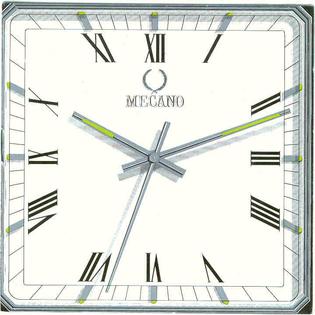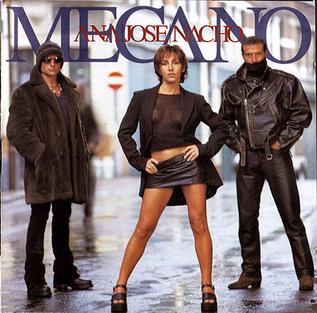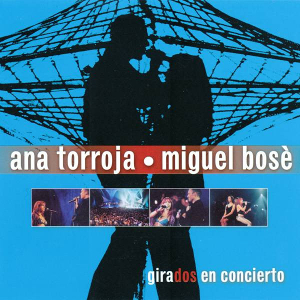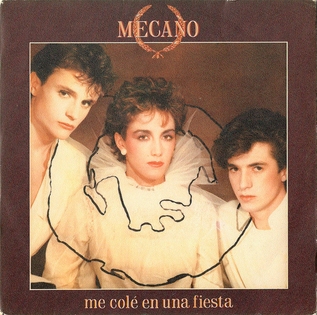
Mecano was a Spanish pop band formed in 1981 and active until 1992. Mecano became one of the most successful Spanish pop bands of all time. The band is still the best-selling Spanish band, with over 20 million records worldwide. They were considered by some to be avant-garde for their time and part of la Movida Madrileña countercultural movement. They had a brief comeback in 1998.

Ana Torroja Fungairiño, 3rd Marchioness of Torroja, is a Spanish singer. She was the lead singer of the pop trio Mecano, considered one of the most popular pop bands from Spain during the 1980s and 1990s. Mecano split in 1998 and she embarked on a solo career.

José María Cano Andrés is a Spanish visual artist, musician, composer, and record producer. From 1982 to 1998, he was a member and principal composer of the Spanish pop-rock band Mecano. Since 1998, he works primarily in the visual arts.
"No Controles" is a song written by Nacho Cano, and recorded and released by the Spanish band Olé Olé in 1983.

Hoy no me puedo levantar is a Spanish jukebox musical, with music and lyrics by José María Cano and Nacho Cano, former members of the band Mecano. Based on 32 of the band's greatest hits and named after their first single, the musical centers on a pair of impoverished musicians trying to be part of La Movida Madrileña, after the fall of Francisco Franco's dictatorship. Through an analysis of the 1980s, the musical portrays the condition of these boys trying to survive in Madrid, under the shadow of drugs and AIDS. The musical ran for four seasons in Madrid's Rialto Theatre and for three seasons in Mexico City's Centro Cultural Telmex and Teatro Aldama. It was produced by Drive in Spain and OCESA Teatro in Mexico.

Mecano is the debut studio album recorded by Spanish synth-pop band Mecano, released on April 5, 1982, under the label Discos CBS.

María José Loyola Anaya, known professionally as María José, is a Mexican singer, ballerina, flamenco dancer, athlete and television personality. Her career started at age 15, in the 1990s, when she joined the Mexican band Kabah as a vocalist. After leaving the band in 2006, she continued on as a solo artist and has released six studio albums to date.

María Fernanda Castillo García, known as Fernanda Castillo, is a Mexican actress. She is best known for her work in several telenovelas, including her role as Mónica Robles in El Señor de los Cielos.

Alan Estrada Gutiérrez is a Mexican actor, dancer and singer. His best known role was "Mario" in the Spanish musical Hoy No Me Puedo Levantar. He is also known for his YouTube channel Alan X El Mundo, documenting his world travels.

Ya viene el Sol is the third studio album by the Spanish synth-pop band Mecano, released on October 16, 1984 by CBS Discos. The album was the beginning of a more sophisticated and mature sound. It included new sounds in the band's music, utilising the Fairlight CMI, a digital sampling synthesiser. After this album, the band assumed the production of their records from the start. This album includes the only song that the band's lead vocalist Ana Torroja wrote with the band ("Mosquito"). The importance of the songs written by José María Cano and the fact that, for the first time, one of his songs was released as a single – and became the biggest hit of the summer – kept the band together, since at this point he was considering leaving the band.

Descanso dominical is the fifth studio album by Spanish pop band Mecano. It was released on May 24, 1988, in Spain and Spanish America, 1989 in Italy and 1990 in France under Ariola Records. This was the album that reaffirmed their stardom as worldwide artists. Before its release, this album was intended to be a 2-disc album due to the large amount of material, but that intent was cancelled. The album is also known in France as Une Femme Avec Une Femme and as Figlio della Luna in Italy. The title of the album was taken from a line in the fifth single "El blues del eslavo".

Ana José Nacho is a compilation album by the group Mecano. It was released in 1998, and was produced by the group itself. There are two editions: Spain and France. It includes 8 new songs by the brothers Cano: José and Nacho; these tracks were recorded in CTS Studios and Belsize Park in London; and Red Led and Eurosonic in Madrid.

Daniel Diges García is a Spanish singer, pianist, composer and actor. Although born in Madrid proper, he has spent all his youth in the neighbouring city of Alcalá de Henares.

Regina Blandón is a Mexican actress. She is known for her role as Bibi P. Luche in the sitcom, La familia P. Luche. Blandón is the daughter of actor Roberto Blandón.

Girados en Concierto is a live-concert double-album by Latin Grammy-winning Spanish musician and actor, Miguel Bosé and Spanish singer Ana Torroja, formerly of the group Mecano. It was released in the U.S. on May 14, 2002. The only completely new song on the album is Corazones (Hearts), a duet written and performed by both; the rest are hits from each of their respective careers. In the case of Torroja the songs include solo hits as well as from her years with Mecano.

Javier Godino is a Spanish actor.

Brava! (Brave!) is the tenth studio album and second bilingual album by Mexican recording artist Paulina Rubio, released on November 15, 2011 by Universal Music Latino. Two of its three singles "Me Gustas Tanto" and "Boys Will Be Boys" became hits for Rubio.

Ignacio Cano Andrés, better known as Nacho Cano, is a Spanish arranger, composer, musician and record producer. He and his brother showed an interest in music in their young lives. At 5, he began to play the Spanish guitar and at 12 he started his first band called "Prisma", with Toti Arboles and Eduardo Benavente, both of whom would later make up the core of the sociocultural movement that took place in Spain after Franco's death, known as the "Movida Madrileña". After playing in several different bands in his early teens, Nacho formed Mecano with his brother Jose and his brother's friend Ana Torroja. At 16, Nacho wrote "Hoy No Me Puedo Levantar". Mecano signed their first record deal with CBS, when Nacho was 17 years old. This first album smashed all sales records in Spain, selling 1,000,000 copies in three months.

Gonzalo Alcaín is a Spanish singer and musical actor. He has been one of the contestants on the second season of the musical talent show The Voice in Spain.

"Me Colé en Una Fiesta" is a song written and performed by the Spanish band Mecano. It was released as the third single of their debut studio album Mecano by Discos CBS on March 22, 1982.



















